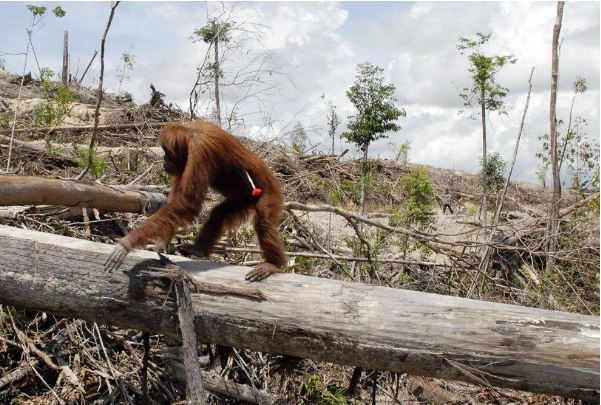Recently, it appears palm oil is everywhere – all over social media and the news. This is partly thanks to the banned Iceland advert at Christmas, starring an orangutan forced to flee his home and hide in a little girl’s bedroom due to the palm oil industry. The truth is palm oil has always been everywhere. It is certain that you will have bought products containing palm oil in your lifetime as it is used in nearly everything, including bread and many snack foods. The use of palm oil isn’t limited to food, however. Many shampoos and soaps contain palm oil due to its ability to remove oil and moisturise. We even use palm oil to make biodiesel for our cars.
Superficially, palm oil sounds great. It’s versatile, cheap, and an extremely efficient oil. Many would argue that its use as an alternative to fossil fuels is a step towards a greener approach to travel. Unfortunately, not all is as it seems.
Palm oil isn’t created out of thin air. As the name suggests, it comes from palm trees found in rainforests and our unquenchable thirst for it has devastating consequences on our environment. The WWF state that an area of rainforest the size of 300 football fields is cleared every hour to make space to produce palm oil.
This deforestation is happening at the expense of our planet’s biodiversity. Due to unsustainable palm oil production destroying their natural habitat, a third of mammal species in Indonesia are currently considered critically endangered. Orangutan’s are particularly affected. Over 90% of their habitat has been destroyed in the last 20 years and an estimated 5000 orangutans are killed each year when preparing land for palm oil production. Findings have shown that orangutans could be extinct in five years at the current rate of deforestation and the situation has been considered a ‘conservation emergency’ by the United Nations. Orangutans are vital in the ecosystem of the Indonesia rainforest. Some seeds only germinate after passing through the gut of orangutans. They are vital in the existence of the forest. Orangutans aren’t the only animal affected. Other animals at risk include; the Sumatran Tiger, the Pygmy Elephant, and many others.
Deforestation for palm oil also contributes significantly to climate change. The removal of forest to make way for oil palms involves burning thousands upon thousands of native trees, releasing immense quantities of pollutants into the atmosphere. Indonesia is the third highest greenhouse emitter because of this.
This doesn’t mean we should stop producing palm oil – it’s a useful resource. Sustainability is key. The RSPO (Roundtable on Sustainable Palm Oil) works towards developing sustainable production of palm oil and many brands have started to use sustainable palm oil in their products. This will help reduce deforestation and the habitat loss for many animals. Many products that use sustainable palm oil will include the RSPO label, which looks like a palm leaf, on their packaging. The WWF have a website that shows which brands and manufacturers comply with RSPO guidelines.
In the meantime, here are some ways you can help to reduce your use of palm oil until its sustainability is increased:
- Home cooking: Meals made from fresh ingredients will reduce your consumption of palm oil. It is mostly processed foods that contain palm oil.
- Read labels: This is one of the easiest ways to see if the things you love contain any palm oil, and whether the palm oil is sustainable.
- Signing petitions and writing to elected representatives: This puts pressure on companies and policymakers to make change.
- Using public transport or walking: When possible, this is an effective way to use less palm oil. Over 60% of the 7.7 million tons of palm oil consumed by the EU last year was used on energy and biodiesel.
By Robbie Nichols

